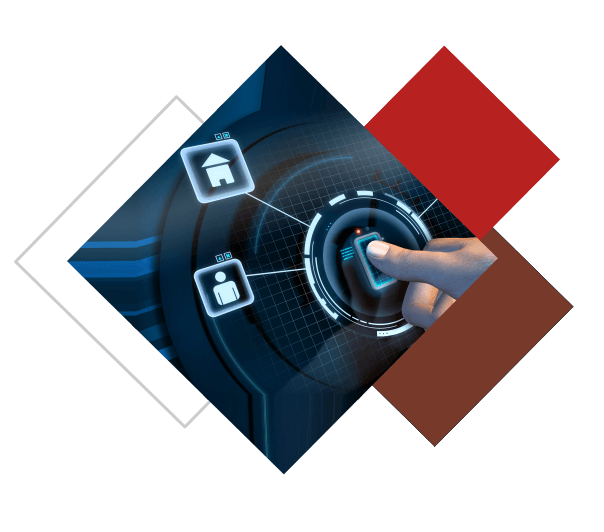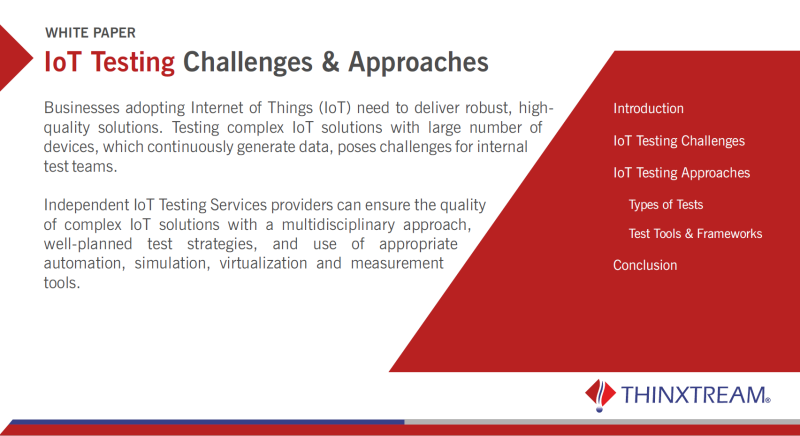

Launch Superior Connected Products
& Smart Services
& Smart Services

Your business needs to deliver high-quality Connected Products and Smart Services to increase customer satisfaction and minimize liability.
Testing complex IoT solutions with large number of IoT devices, which continuously generate data, poses challenges for internal test teams. Independent IoT Testing can ensure quality of complex IoT solutions with a multidisciplinary approach, well-planned test strategies, and use of appropriate automation, simulation, virtualization and measurement tools.
Thinxtream possesses extensive IoT testing expertise to ensure high-quality IoT solutions. We leverage a comprehensive set of test strategies, test types, test tools and test cases across hardware and software.
Have you tested your IoT solution for quality and scalability?
Connect with us today to leverage our IoT testing services.
Thinxtream ensures the quality of complex IoT solutions with a multipronged testing approach. This requires a well-planned IoT testing strategy that is comprehensive and is constantly evolving with changes. Our testing strategy encompasses test management tools, test classes, test lab setup comprising simulators, ready-made tools, and extensible frameworks.
Our tests address all individual components of the IoT solution including hardware and software, as well as the integrated solution.
A usability test ensures that the interface of the IoT device and the IoT application meets user’s expectations. The primary focus of these tests are to ensure ease of use for most basic operations, responsiveness, preserving nativity, graceful handling of errors and ability to use the device/app without training or a guide.
Security in its most basic form means that authorized access is granted to the protected IoT device and its data and unauthorized access is restricted. Testing is done using threat modeling tools, static code analysis tools and runtime check tools, which subject the IoT device and IoT application to a range of simulated threats. Security tests also encompass checks for OWASP Top 10 threats.
This testing involves checking the IoT device and IoT application behavior on subjecting the network through a load, intermittent failures, and total loss of connectivity. By inducing these real-life scenarios, the robustness of the IoT solution is checked.
On the device, these tests check their responsiveness to user actions and on a platform layer, it checks ability to handle spikes in traffic gracefully. They are based on metrics for assessing the responsiveness of the IoT device/application and underlying system performance. Load generators and performance measuring tools on the cloud rate system performance under normal and full load.
In a complex IoT environment, devices, network, platforms, applications and end-user desktops/mobiles work in tandem. Each one of them has a high degree of variability in terms of the firmware and hardware models and versions; network type, speed, protocols and versions; operating system type and versions; browser type and versions; screen sizes and display resolutions to name a few. It’s important to test the IoT solution in all possible combinations of these versions to reduce failures in the field.
A well tested IoT solution may also require the right certification to enter the market. IoT devices generally have to meet various certification requirements for the network, protocol compliance, device drivers, app store submissions, etc.
Whenever firmware, software or hardware updates or upgrades occur, it calls for thorough regression testing as failures may arise due to compatibility issues. Post the upgrade, data preservation and a smooth system restart are critical. To address this, special tests are often performed in a staging environment before upgrades are pushed OTA to IoT devices and IoT cloud.
Have you tested your IoT solution for security and compliance?
Connect with us today to leverage our IoT testing services.
The scope of our IoT testing expertise includes determining test strategy, determining/preparing test environment and test ware (i.e. test cases, suites and harnesses), automation of build, test setup and execution, performing product QA tests and certification tests, tracking results, problems/bugs and fixes, employing defect tracking mechanisms, tools and traceability matrices.
White-box, black-box, scenario, regression, performance benchmarks, load, reliability and stress, scalability, deployment, interoperability, code coverage, OS and browser compatibility, security requirements and updates, re-certification
Hardware, firmware, drivers, cloud, desktop, mobile, Web
Selenium, TestComplete™, Micro Focus® Unified Functional Testing (QTP), Micro Focus LoadRunner, WAPT™, Junit™, Custom Python, Perl & VB scripts
Postman, Progress® Telerik® and Fiddler™, SoapUI™, Swagger™, etc.
WebNMS, WireShark®, VMWare®, Hyper-V, Ghostscript®, AWS Device Farm, Raspberry Pi®
Perfmon, Apache JMeter™
Micro Focus® Fortify on Demand, OWASP ZAP, VCG, Microsoft® Threat Modelling Tool
TestRail™, JIRA®, Redmine, GForge

Testing complex IoT solutions with large number of connected devices, which continuously generate data, poses challenges for any business. Read our IoT Testing Challenges & Approaches White Paper to see how a multidisciplinary IoT Testing approach, with well-planned test strategies, and use of appropriate automation, simulation, virtualization and measurement tools can result in high-quality IoT solutions.
Interested in discussing your Technology needs?